UMMC experts: COVID-19 shots good for children 12 and older
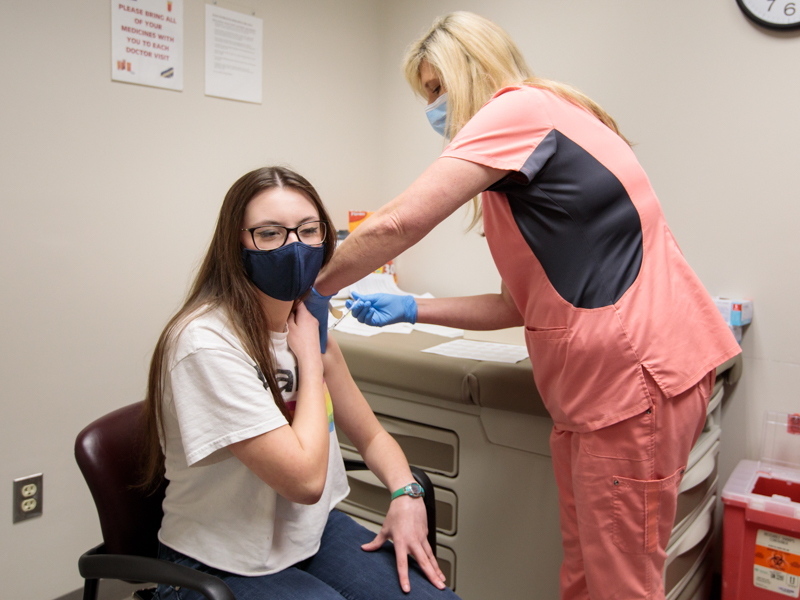
Rosemary Williamson has a full summer to look forward to, with her COVID-19 vaccination today bringing her a step closer to a pre-pandemic lifestyle.
“I’m glad I got the shot,” the Clinton 14-year-old said at the University of Mississippi Medical Center’s vaccination clinic at the Jackson Medical Mall. “I don’t like getting shots, but I’m really glad I got this one because it’s important.”
UMMC pediatric experts and the U.S. Centers for Disease Control and Prevention couldn’t agree more.
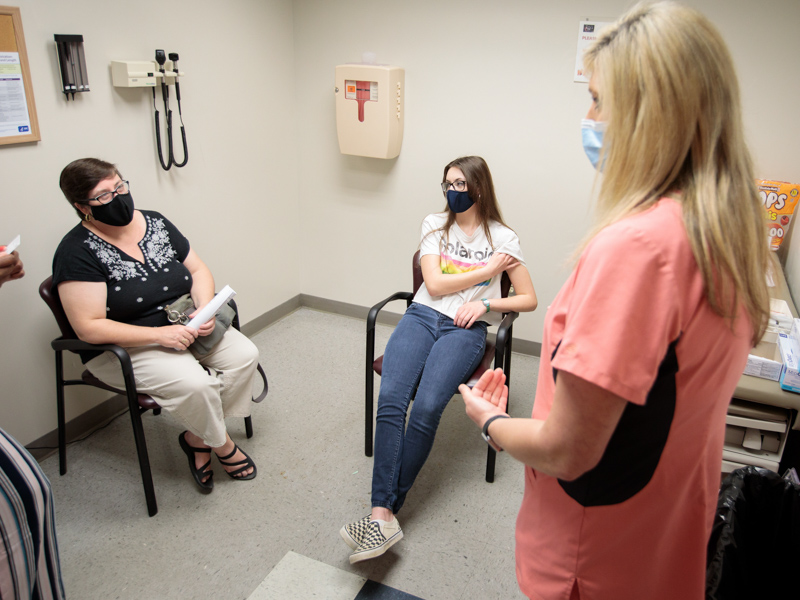
The CDC's Advisory Committee on Immunization Practices on Wednesday expanded eligibility for the Pfizer-BioNTech COVID-19 vaccine to children ages 12 to 15. Previously, the vaccine was available to those 16 and older. The U.S. Food and Drug Administration authorized the age extension of the vaccine on Monday. Today was the first day Pfizer vaccine was available to 12- to 15-year-olds.
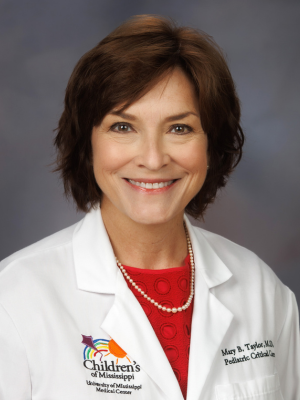
“Approval of the Pfizer vaccine for children 12 to 15 years old is a significant step in pediatric care and in fighting COVID-19,” said Dr. Mary Taylor, Suzan B. Thames Chair, professor and chair of pediatrics at UMMC. "This will protect children ages 12 to 15 from the risk of COVID-19 and complications of it, such as Multisystem Inflammatory Syndrome in Children.”
Multisystem Inflammatory Syndrome in Children, or MIS-C, is a rare but serious condition that is thought to be a delayed reaction to COVID-19. In MIS-C, the immune system of a child who has been infected with COVID-19 attacks the body’s healthy cells, particularly those involving blood vessels, the heart and other organs.
Once fully vaccinated, children in this age group will be able to more safely enjoy many activities missed in 2020 due to safety concerns.
“Families having access to the vaccine will also help protect children in this age group as they enjoy healthy activities, such as playing team sports or going to summer camp,” said Taylor, a Children’s of Mississippi provider. “This not only will protect this population but also those with whom they come in contact. This will bring Mississippi closer to having herd immunity to COVID-19.”
The CDC has advised that those who are fully vaccinated can see others who are also fully vaccinated without masks or distancing.
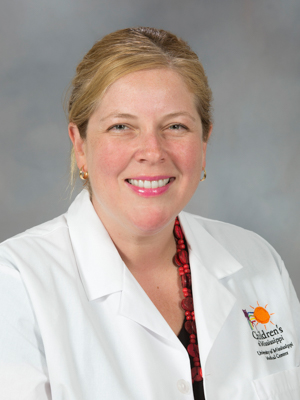
“We know that an increasing the number of people getting the vaccine now is allowing us to see a light glimmer at the end of the pandemic tunnel,” said Dr. Charlotte Hobbs, professor of pediatrics and infectious diseases specialist at UMMC.
As for all other age groups, the Pfizer vaccination for 12- to 15-year-olds includes two shots given three weeks apart.
COVID-19 vaccinations are free and can be scheduled at the UMMC Vaccine Clinic in the Jackson Medical Mall by calling (601) 815-3351 or online here.
Dr. Anita Henderson, president of the Mississippi Chapter of the American Academy of Pediatrics, said pediatricians and parents are happy with the CDC’s decision.
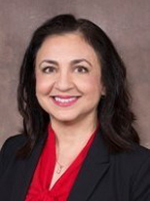
“We have many patients and families who have been anxiously awaiting this announcement and their children are ready to roll up their sleeves,” the Hattiesburg pediatrician said. “We know that children with asthma, obesity, diabetes and sickle cell are at increased risk of hospitalization from COVID-19. Some of these children and families have chosen virtual school this past year, so vaccinations will allow them now to safely return to the classroom.”
According to data from the Mississippi Department of Health, 5,467 students in grades K through 12 contracted COVID-19 from January to May 7 this year. Another 7,212 students were reported positive for the virus from during the first semester of this academic year.
UMMC researchers found that the actual number of Mississippi children infected with the virus that causes COVID-19 may be higher than previously thought.
“While we see that younger children more commonly have milder disease with COVID-19, it turns out that there are a lot more kids infected with SARS-CoV-2 than case numbers indicate,” said Hobbs, who was lead author of the study published in the March 4 issue of the CDC’s Morbidity and Mortality Weekly Report.
The study found that the estimated percentage of Mississippi children with antibodies specific to SARS-CoV-2, the virus that causes COVID-19, increased from 2.6 of those collected in May to 16.9 percent of those collected in September.
Since the outbreak of COVID-19 in Mississippi, the state has recorded 314,147 cases and 7,244 deaths.
While many younger people who contracted COVID-19 have been asymptomatic, a growing number of them require hospitalization, Hobbs said.
“Children in this age group, namely those 12-17 years of age, continue to comprise an increasing number of COVID-19 lab-confirmed hospitalizations by CDC COVIDNET data,” she said. “We are seeing this shift now to younger persons in general bearing the burden of this disease due to vaccine success in older populations.”
Henderson said some parents are hesitant to have their children vaccinated.
“They have questions, and we as pediatricians are ready to have those discussions and review the risks vs. benefits of this vaccine and all vaccines,” Henderson said. “Vaccinating children 12 and up will protect those children from getting COVID-19, protect their families and loved ones and allow for a more normal school year this fall.”
The pediatricians note that children have suffered academic, emotional and social setbacks from being away from in-person school, classmates and activities.
“Vaccinations would prevent many of the disruptions to school and extracurriculars that we have seen this past year,” Henderson said.
Hobbs agreed. “The vaccine will help children get back to school, and many of the issues associated with lack of in-person schooling will go away again with children being vaccinated. Also, on a population level, children have to be vaccinated for us to see the potential control of the pandemic for which we are all hoping.”
Amy Williamson, Rosemary’s mother, said her daughter’s dose of the COVID-19 vaccine, “feels like relief. She can go do more, and, along with social distancing and masking, it’s another layer of protection.”
Parents should talk with their pediatric health care providers to make sure all their children’s vaccinations are up to date as they schedule COVID-19 vaccinations for their adolescents.
“COVID-19 is a risk to children’s health, and so are diseases such as measles, mumps, pertussis and others that we have immunizations to prevent,” Taylor said. “Having COVID-19 vaccinations open to children from 12 to 15 will protect them from the pandemic and make school, sports and community activities safer for everyone.”


